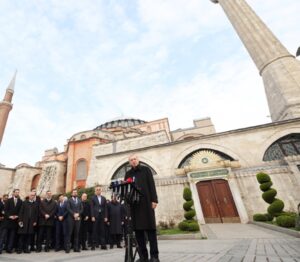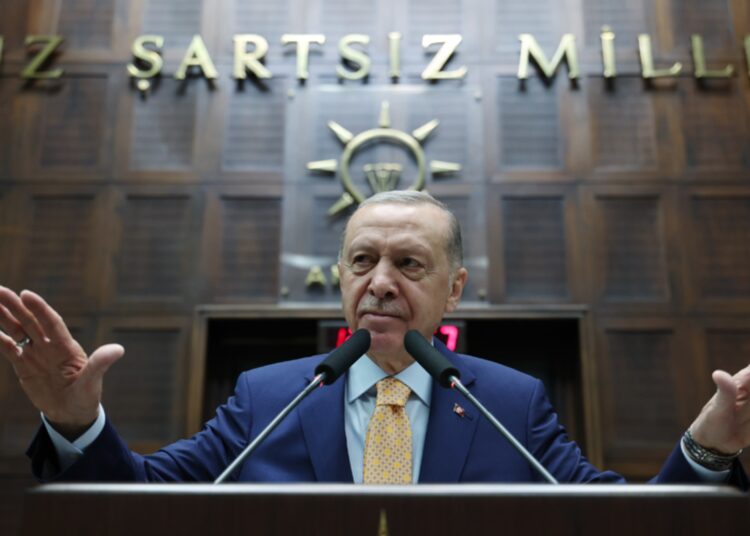Abdullah Bozkurt/Stockholm
A collection of God and prophet-like public praises uttered by and for Turkey’s strongman, Recep Tayyip Erdogan, offers a glimpse into the psychological state of a leader who believes he possesses superior abilities and apparently suffers from a God complex.
Having ruled a country of 85 million, extending from Asia to Europe, with the imperial legacy of the Ottoman Empire for 22 years, Erdogan has decimated the opposition, imprisoned his critics and opponents, consolidated all levers of power in his hands, destroyed checks and balances and become the sole decision-maker on all matters in his own country.
His inflated view of his abilities and infallibility, coupled with the presence of yes-men surrounding him, reinforces his narcissistic personality and shores up his superiority complex. He considers himself the caliph, the leader of the entire Muslim community worldwide, and therefore believes he deserves special consideration.
Following his party’s defeat in the March local elections, which relegated his ruling Justice and Development Party (AKP) to second place for the first time in two decades, Erdogan addressed his party’s lawmakers in parliament on April 17, stating, “Ladies and gentlemen! Let everyone see and know this: Nothing is over until we say it’s over.”
At face value, this expression seems innocent enough for a politician who suffered a defeat in the elections and aimed to mobilize his demoralized support base. Yet, in the context of political Islamic circles, in which Erdogan has deep roots, it has quite shocking ramifications since it appears to challenge the divine will of Allah, one of the six main pillars of Islam, which means Allah is the ultimate decision-maker and everything happens only according to His divine will.
The remark reflects Erdogan’s inner thinking as he has become accustomed to being the final arbiter in Turkish matters after a long rule of near-absolute power. Erdogan did not utter these words in a vacuum; he has a long track record of seeing himself in such a godly manner. The worshipful praise from his followers has certainly contributed to shaping the president’s psyche.
This was not the only instance where Erdogan expressed his God-like attributes publicly and openly. In March 2014, speaking at a campaign rally, Erdogan said, “We have come for mercy, not for wrath. Our mercy will prevail over our wrath.” He was explaining how his government would act against his critics and opponents. This expression was, in fact, a direct reference to Allah’s unique attribute in the conventional Islamic school of thought, which was described in a saying of the Islamic Prophet Muhammad: “When Allah decreed the creation, He pledged Himself by writing in His Book which is laid down with Him: ‘My Mercy prevails over My Wrath.'”
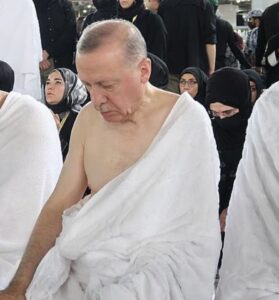
Erdogan’s statement was criticized within the opposition bloc of the political Islamic platform. Milli Gazete, the flagship daily of the opposition Islamic political Saadet Party, wrote, “Erdogan’s mentioning Allah’s attribute in connection with himself sparked controversy. … His associating himself with the attributes of Allah astonished the audience.”
Attributions of God-like superiority to Erdogan were also expressed by his associates and senior members of his ruling party, the AKP. Erdogan remained silent in the face of such expressions, tacitly signaling that he, in fact, enjoys such comparisons.
In July 2011 the AKP’s then-Bursa deputy Hüseyin Şahin stated after talking and visiting Erdogan that “even touching our esteemed Prime Minister [Erdogan], I believe, is an act of worship. I’m saying this because even his presence energizes us.” When he was criticized for such remarks, the lawmaker said he stood by his statement. Şahin served in parliament until 2018.
Fevai Arslan, another lawmaker from Erdogan’s ruling AKP, said in January 2014, “There is Mr. Recep Tayyip Erdogan, a leader who embodies all the attributes of Allah. They wanted to thwart him.” Arslan made these remarks during the opening ceremony for campaign headquarters in his home province of Düzce. Arslan served as a lawmaker in parliament until 2018.
Describing Erdogan as a world leader, the lawmaker claimed that world powers do not want Turkey to become a leading nation in the Middle East and that is why they wanted to prevent Erdogan from winning the elections on March 30, 2014. “The Turkish people have not allowed all this since 2002 [when Erdogan first came to power], and hopefully they will not allow it in the future, either,” he added.
Zülfü Tolga Ağar, a long-time AKP lawmaker, likened Erdogan to God in a speech he made in August 2019, stating, “When we are told about the President, it feels like we are being told about Allah.” Ağar is the son of former interior minister Mehmet Ağar, who is now in charge of coordinating organized crime syndicates and mafia groups in Turkey on behalf of President Erdogan.
Addressing some 1,500 party faithful in November 2009, İsmail Hakkı Eser, the AKP’s then-Aydın provincial office head, told the crowd, “Let no one doubt the love and respect our people under this roof have for our Prime Minister [Erdogan]. We are devoted to our Prime Minister; he is like a second prophet to us. Betraying the Prime Minister is something we can never accept.” Eser continues to serve as a senior member of the AKP in Aydın and has assumed official roles such as a member of the city council.
Former EU affairs minister Egemen Bağış declared several cities to be holy, akin to the Islamic holy sites of Mecca and Medina, in February 2013, saying, “Rize, Istanbul and Siirt are holy cities because these three cities have been instrumental in the birth of the greatest leader in the history of the Republic of Turkey.” Rize is Erdogan’s family’s home province, while Istanbul is where he was brought up and entered politics. Siirt, his wife’s home province, is the constituency where he was elected to parliament for the first time in a March 2003 repeat election. Despite being incriminated in a multi-million dollar graft scheme, Erdogan stood by Bağış and appointed him ambassador to the Czech Republic.
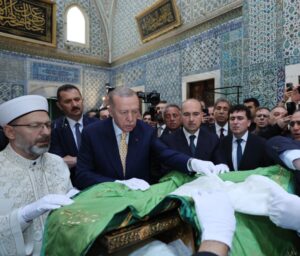
Some went as far as saying that Erdogan surpassed the Islamic Prophet. Efkan Ala, then interior minister, said, “Prophet Muhammad was overtaken by pride, so God warned him. We, on the other hand, will not be tempted by pride.” His successor, Süleyman Soylu, claimed in December 2021 that the work of the Erdogan government was the work of Allah. “Don’t just look at what we do. We don’t do it by ourselves. We believe that it is Allah who makes us do it,” he told the party faithful in Bursa province.
In February 2010 Oktay Saral, an AKP politician who governed the Of district of Trabzon province, called for the worship of Erdogan and said that a prayer of gratitude, similar to Muslim rituals for God, must be performed because Erdogan is the blessed leader of the Islamic world. A year later, Erdogan rewarded him by making him a member of parliament.
Some of Erdogan’s deputies likened his speeches to the Sunnah, which refers to the sayings and practices of the Prophet Muhammad and is considered to be the second authoritative source of knowledge for Muslims after the holy Quran.
Speaking in Çanakkale province in May 2013, former MP Agâh Kafkas described Erdogan’s bargaining for a project completion deadline with contractors who were awarded government tenders as akin to the Islamic Prophet’s model, saying, “This is the Sunnah of our Prime Minister. This is the difference with Tayyip Erdogan.” His words sparked reactions from Islamic circles, who criticized the deputy for exploiting religious and sacred values for political goals.
AKP Ordu deputy Şenel Yediyıldız made similar remarks, attributing Erdogan’s behavior to the Prophet’s Sunnah. Attending a wedding ceremony in August 2021, the lawmaker said he wanted to follow Erdogan’s Sunnah before handing the marriage certificate to the newlywed couple.
There have been dozens of instances of God-like attributions made for Erdogan during his more than two decades of rule in Turkey. None of them were challenged by Erdogan himself, who appeared to enjoy such praise. In his self-perception, perhaps he feels like a god or a God-chosen messenger who came to power to lead Muslims all over the world.
At times, Erdogan’s belief in his omnipotence created headaches for him and his government. When he declared himself an economist who knew all about free market forces and instructed the central bank to change course by adopting unorthodox and unconventional policies, the Turkish economy and finances went into deep trouble. He was eventually forced to change course after substantial damage was inflicted on Turkey’s foreign currency reserves, investment portfolio and currency value.
He has deliberately stoked tension with Russia, the US, the European Union and Gulf states at different times using various pretexts, only to later back down when his bullying tactics started to hurt him and his inner circle, threatening his rule in Turkey.
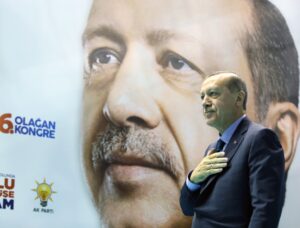
The constraints he faces in shaping economic and foreign policy do not appear to have permanently changed Erdogan’s mindset as he is ready to engage in risky or reckless behavior when he sees an opportunity. At times, he seems to have a hard time making meaningful connections between events and loses sight of objectivity. He believes he is an invincible underdog who will come back on top every time, despite the blows and defeats he perceives as only temporary. In other words, he ignores his faults and often shifts the blame to others when mistakes happen.
He certainly believes he is entitled to special treatment, demanding admiration, blind loyalty and respect from people. He has no regard whatsoever for accountability. He lacks empathy, especially for his fellow Muslim citizens who oppose his rule. In his self-deluded world, there are only two camps: us vs. them, as Erdogan often describes such division in Turkish society and the Muslim community worldwide. Polarization and division have been the hallmarks of his long rule.
Compounding matters further is that President Erdogan is surrounded by yes-men and women who worship him and dare not utter views that would displease him. The profile of people he has chosen to include in his inner circle paints a picture of those who shy away from critical thinking and avoid challenging views in the governance of the country.
In reality, Erdogan is nothing but a thug, a narcissistic dictator who abuses religion for his political ambitions while enriching his family members and associates with billions of dollars through pervasive corruption in his administration and profits from all sorts of illicit business activities and criminal enterprises.
